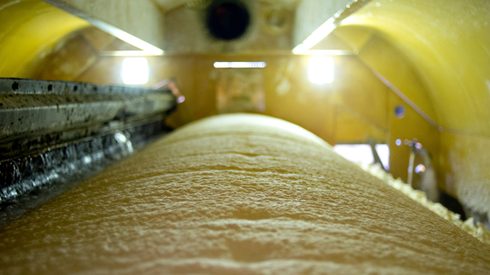As US pulp markets limped through the weak demand season of summer, buyers pressured down regular contract prices across key grades but spot market erosion slowed, industry contacts told Fasmarkets’ PPI Pulp & Paper Week.
Pricing for the benchmark northern bleached softwood kraft (NBSK) dropped $50-80/tonne as buyers pared back the wide differential between deals done on and off-contract. Meanwhile, the world’s biggest producer of hardwood announced a $20-50/tonne price increase, effective Sep 1.
US NBSK preliminary effective list prices declined with the $50-80/tonne decrease as some buyers pivoted from spot purchases to fill up volumes with regular contract tonnage. US SBSK preliminary effective list prices were down $60-80, according to P&PW surveying.
“Pulp availability is not changing”
After a spring and summer in which producers lost volume to competitors offering cheaper spot market deals in both NBSK and SBSK, buyers are only refilling contract volumes where suppliers concede to bigger month-over-month decreases than in spot markets.
“I’m not buying spot softwood in August (because) my contract pricing is really starting to catch up to spot pricing,” said a US buyer contact, who landed a reduction in the high range of this month’s decrease. “The availability is not changing.”
Availability will prove key to pricing in the coming weeks because, after the recently reported 660,000-tonne decline in global producer inventories, some producer contracts are holding out hope that this month will represent a bottom in US markets.
Asked if this year’s supply overhang eased in the wake of the reported decrease, no buyers felt a supply pinch would occur anytime soon because North American demand is too weak to quickly lean up inventories from their still-bloated levels.
Pulp demand from graphic and specialty papermakers remains tepid, and many firms aren’t taking their full regular contract allotments. But tissue and toweling makers, one of the few strong sectors among downstream market pulp consumers in North America, are mopping up volumes in both contract and spot markets.
Pulp producers pushback on erosion
As a result, any open market buyer with steady demand and large volumes controls the price, sources noted. That doesn’t mean NBSK producers are conceding to yet another month of price declines – at least in domestic spot markets. Some, noting a pricing run in China that started in bleached hardwood kraft (BHK) months ago had spread to NBSK in recent weeks, are attempting to hold flat on US spot prices.
“The spot market is still quite competitive to find traction right now, but we are holding our price,” said a contact at an NBSK producer. “After the port strike (in British Columbia) was averted since mid-July we resumed exporting and that relieved inventory pressure. We also see prices in China are improving and so we don’t want to drop US prices.”
It’s still a buyer’s market though, and where one producer holds flat, competitors are stepping in with volumes at lower prices. That led the US NBSK spot market prices down $10/tonne for net delivered to the US East and Midwest, according to P&PW surveying through Aug. 18.
August is the one year mark from when US spot markets decreased for the first time after a scintillating first half of 2022, when supply chain shocks led to a rally that brought prices to all-time highs. US NBSK peaked in July 2022 and then dropped $30/tonne in August 2022. Spot prices have declined every month since, and with levels now declining 13 straight months, it’s resulted in a combined $395/tonne decrease over the period, down 38.2%, according to P&PW data.
One reason Canadian NBSK producers haven’t yet been able to stop price erosion is a continued flow of SBSK from mills in the US South, where fluff producers are attempting to mute pricing erosion by swinging to SBSK output. The pricing delta has opened up since a year ago, with Americans targeting deals at $40-50/tonne below Canadian NBSK levels. The latest US SBSK prices were down $10.
Suzano surprises with $50 hike
In US BHK markets, buyers were surprised by a $50/tonne increase announced by Suzano, the world’s biggest producer of bleached eucalyptus kraft (BEK) pulp. The Brazilian firm announced $50/tonne hike in North America as well as in Europe, effective Sept. 1 until further notice, sources told P&PW. Also, the firm formally announced a $20/tonne increase to Asian customers.
In China, BEK producers have lifted prices three months straight with a combined $70/tonne rise. That came after Chinese levels bottomed in the mid $400s, though. In North America, there have been no signs of a reversal as both spot and contract BHK prices declined yet again this month.
BHK drops $60-100
US preliminary August prices slid $60-100/tonne in BEK as well as North American-produced BHK, according to P&PW surveying.
BEK is not indexed in US spot markets because Latin American producers rarely venture into US spot markets during bull cycles, and only move spot tonnes during weak periods. With various BEK producers moving tonnes across US spot markets, it’s a sign that markets remain weak.
However, BEK producer sources believe that by September, North American markets will improve because this year’s inventory overhang has eased, Chinese demand remains strong, and there is continued upwards pricing momentum across Asia.
“I believe in that. What’s happening in Asia, it is real. The only additional inventory I have is for contract customers. Other than that, I have no additional inventory,” said a source at a major BEK producer.
Asked about US port warehouses that sources noted were overstocked with imported pulp, the contact said that pile-up, too, has begun easing: “I’ve visited all the key ports in the last few months, and I didn’t see anything crazy.
Interested in finding out more about the pulp market? Take a look at our forecasts for major grades and subscribe to our news and market analysis, including PPI Pulp & Paper Week.





